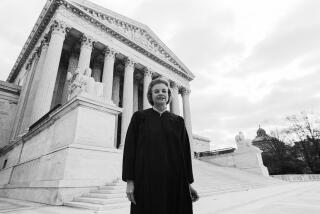Ginsburg Explains Origin of Sex, Gender : Justice: Supreme Court’s newest member speaks at her old law school and brings down the house with her history lesson about fighting bias.
- Share via
NEW YORK — Supreme Court Justice Ruth Bader Ginsburg brought gales of laughter at her old law school Friday when she explained why she started using the term gender discrimination instead of sex discrimination.
“I owe it all to my secretary at Columbia Law School, who said, ‘I’m typing all these briefs and articles for you and the word sex, sex, sex is on every page,’ ” Ginsburg said.
“Don’t you know that those nine men (on the Supreme Court)--they hear that word, and their first association is not the way you want them to be thinking? Why don’t you use the word gender? It is a grammatical term and it will ward off distracting associations.’ ”
Ginsburg spoke at a special panel in her honor, and later in the day received the law school’s highest alumni award.
It was billed as a discussion of landmark sex discrimination cases, but panelists spent most of the time reminiscing about Ginsburg’s teaching days, when she was a pioneer in litigating women’s rights cases.
“This homecoming is the grandest event I have attended since I got this wonderful job,” the newest Supreme Court justice told the audience of 550 law students and faculty.
The panel was made up of three former students of Ginsburg and a former associate at the American Civil Liberties Union, all now highly respected lawyers in their own right.
Kathleen Peratis, who succeeded Ginsburg as director of the ACLU’s Women’s Rights Project and is now in private practice, recalled naming her baby daughter after the justice.
When her daughter was old enough to pay attention, Peratis told her “that she was named after the woman who was going to be the first woman on the Supreme Court.” When Sandra Day O’Connor achieved that distinction, her daughter said, “What’s the matter, Mom? You told me it was going to be Ruth.”
“I said, ‘Just wait,’ ” Peratis said.
Lynn Hecht Schafran, who assisted Ginsburg with Supreme Court briefs, recalled being unprepared for Ginsburg’s sex discrimination seminar one day because she had been sick the night before.
“I was waiting for a stern rebuke,” Schafran said. Her impression of Ginsburg at the time was that she was “very severe.”
But there was no rebuke. Like the media during Ginsburg’s nomination and confirmation hearings, she had misread her mentor’s reserve for coldness, Schafran said. “They did not have the opportunity to understand, as I did . . . her wonderful compassion and humanity.”
More to Read
Get the L.A. Times Politics newsletter
Deeply reported insights into legislation, politics and policy from Sacramento, Washington and beyond. In your inbox twice per week.
You may occasionally receive promotional content from the Los Angeles Times.










